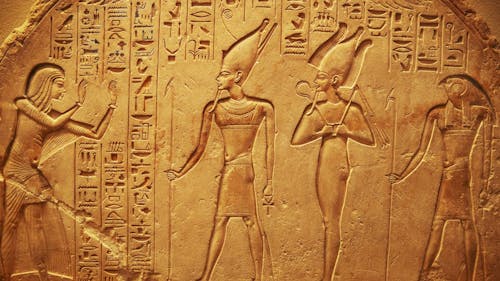FUCHS: How learning ancient languages improves educational experiences
Column: Questioning Jules

During this past semester, I began taking hieroglyphic Egyptian as a language class. Due to my aspirations for a career in archeology, this was a natural choice for me as, if I did not take it now, I would have to take it in graduate school anyway.
The beginning of the road was stressful and disappointing as I struggled with learning the language at first. As I proceed through my final exam, I am proud that I chose to take hieroglyphics and look forward to continuing my studies in the spring semester.
Out of all the classes I have taken throughout college, hieroglyphic Egyptian, without a doubt, has been both the most challenging and enjoyable. I had to learn a lot of time management skills and work on my patience as I spent many hours working on homework assignments and studying for exams that I never truly felt prepared for.
Despite the hardships I faced while taking this course, I feel more acquainted with ancient Egyptian culture as a result and have a better understanding of ancient languages.
A lot of students do not see the value in the language departments at Rutgers University. It is beneficial to take modern languages as language learning promotes a lot of mental skills. It is also good to learn how to communicate with others and have an increased understanding of language and communication skills.
As a French minor, I am thankful for all the opportunities I have had through the Department of French. I not only have the ability to speak to other students in French but also have been able to write magazine articles in French and learn more about the culture as a whole.
Taking an ancient language was completely different from learning a modern and popular language like French. Since Middle Egyptian is a dead language, in class we do not speak the language. We merely learn how to transliterate the hieroglyphic signs to understand their English meanings. With the translations, we read ancient stories and prayers to gain a better understanding of ancient Egyptian culture.
Although it might seem useless to take a dead language class, it helps to improve linguistic and mental skills more than a modern language. When translating a hieroglyphic passage, you must pay very careful attention to the structure of the sentence.
Every small part — prepositions, gender, possessives — is accounted for and needs to be considered. On top of that, there are additionally multiple words that have the same meanings and symbols that look a lot alike.
Not only do you need to make sure that every part of the sentence is accounted for but you also must pay close attention to the context of the passage to see if it makes sense. From taking this course, I have learned a lot about the grammatical workings of ancient languages and how different they are from today’s systems.
People often take for granted the complexities of their native language. Hieroglyphics has been both a stimulating new language and a reinforcer for a lot of older English rules I learned as a child.
Unlike French, when completing assignments, I did not have the option to use translator websites or join language-based clubs to help with my coursework. Even in French, translators are not permitted, but there are still easily accessible dictionary websites and spell checkers available.
With hieroglyphic translations, the most help available comes from the grammar book and dictionary. It takes hours to translate even the smallest phrases.
Most of the work done for this class is independent as there are no tutors or teaching assistants available to assist the learning process. I spent many hours completing my assignments, trying to learn the grammatical structures and vocabulary words. On many occasions, I would be unsure of how successful my translations were until I got to class and reviewed the material with the professor.
A lot of people might think that taking an ancient language is both extremely hard and useless. While it may not necessarily be useful for communication, older languages have a lot of academic merits. Ancient languages, specifically, help you to learn more about ancient cultures and explore the roots of language. After all, Egyptian is one of the oldest forms of language.
There is a lot to learn from how hieroglyphics developed from more pictorial symbols to scripts. And who knows, one day you may find yourself in Egypt or even in a museum with the urge to read inscriptions on a tomb or artifact! A few other ancient languages, in addition to hieroglyphic Egyptian, are being offered in the spring.
Julia Fuchs is a School of Arts and Sciences senior majoring in history and anthropology and minoring in French and archaeology. Her column, "Questioning Jules," runs on alternate Thursdays.
*Columns, cartoons and letters do not necessarily reflect the views of the Targum Publishing Company or its staff.
YOUR VOICE | The Daily Targum welcomes submissions from all readers. Due to space limitations in our print newspaper, letters to the editor must not exceed 900 words. Guest columns and commentaries must be between 700 and 900 words. All authors must include their name, phone number, class year and college affiliation or department to be considered for publication. Please submit via email to oped@dailytargum.com by 4 p.m. to be considered for the following day’s publication. Columns, cartoons and letters do not necessarily reflect the views of the Targum Publishing Company or its staff.



